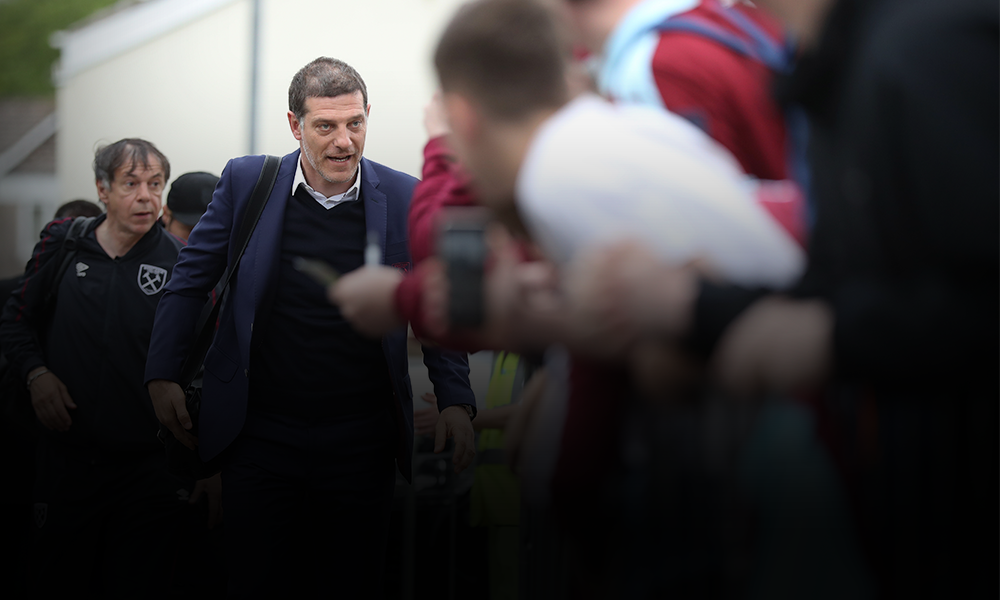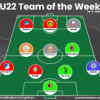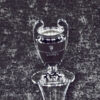Ross Bramble has a look at the various problems plaguing West Ham as the club are seemingly struggling with their identity.
When former Birmingham City owners David Gold and David Sullivan first took control of West Ham back in the winter of 2010, it’s fair to say that the club were in something of a rut. Having largely treaded water across the managerial reins of Avram Grant and Gianfranco Zola, West Ham endured a slow and painful descent from the Premier League in to the Championship. The two David’s vowed to “sort out the mess” at Upton Park, and to their credit, within a few seasons that aim seemed to have been completed.
The Hammers spent only one season in the Championship, escaping through the playoffs under the guidance of Sam Allardyce. The team had been rebuilt after its relegation, and Big Sam had done what he did best – getting results, no matter the circumstances. The only two teams to beat their points total of 86 were Southampton, who had been inside the top two for nearly the entire season, and Reading, whose late season surge saw them obliterate the division and claim an unlikely title win. Hope had been restored, and West Ham fans were beginning to dream of a return to the fabled era of “The West Ham Way”.
Sam Allardyce once again delivered the results necessary to achieve West Ham’s objectives the following season. Survival was guaranteed with a lofty 10th place finish – although, as fans were quick to point out, the season featured only three wins away from home, and only 11 away goals – the lowest in the division. Despite growing angst amongst sections of the fanbase over his style of play, the board kept faith in Allardyce as their plans to relocate to the Olympic Stadium began to take shape – better to keep Allardyce in place and maintain their Premier League safety than take a gamble which could see them lose out on potentially millions of pounds towards their new venture.
The following season, however, Allardyce was not so lucky. Although the Englishman once again kept West Ham in the division – albeit less convincingly with a 13th place finish and a 9-0 aggregate semi final defeat to Manchester City in the league Cup. The voices of discontent grew ever louder, and with Allardyce’s contract set to expire at the end of the season, Gold & Sullivan took the opportunity to part ways with their manager. That particular announcement, however, came not even ten minutes after the final whistle on the last day of the season. Allardyce had not even emerged for his post-match interviews before the news had been posted on social media, much to the shock and condemnation of many neutrals.
Thus began the era of Slaven Bilic – a fan favourite from his albeit brief run as a Hammer in 1996 to 1997. His appointment was seen as the dawning of a new era; a return to “The West Ham Way”, with a manager who knew what it meant and what it took to be involved with West Ham United. That rose garden certainly seemed in bloom during his first season in charge, too, with the club finishing 7th in the league and shattering a number of impressive club records along the way, including highest Premier League points total and highest number of goals scored in a season.
What has been witnessed since, however, is a slow and steady decline. The side failed to qualify for the Europa League proper two years in a row after defeats to Astra Giurgiu on both occasions. The chairmen were promising impressive continental faces, too, and often enjoyed appearing on news outlets to tout the calibre of player the club were now in discussions with. Alexandre Lacazette and Carlos Bacca were both prime targets – both men said no.
In their place came names like Simeone Zaza and Michail Antonio – both excellent players, but lacking the star power and panache that seemed to be promised by the media-friendly chairmen. Throw in a few spats with players like Charlie Austin (who Sullivan claimed had “no ligaments in his knees”) and other lamentable transfer flops, and West Ham’s incredible season under Bilic was starting to feel like a distant memory.
Today, the pressure on Bilic must feel much like that of Atlas and his unenviable trial of carrying the world upon his shoulders. Fans have and continue to turn on the West Ham side that emerges to compete each week, and given their rather shoddy start to the new Premier League season it’s easy to understand why, even on a superficial level. The days of Dimitri Payet are long gone; what festers now is a large disconnect between the fans and the action they witness on the field on a Saturday afternoon.
The question on most people’s lips now is whether Bilic will be able to stem the tide of despondency and frustration emanating from the stands at the Olympic Stadium. Already there are stories that the board are preparing to sack Slaven and replace him with a man rumoured to be unhappy at his current club, Rafa Benitez. But the questions seem a little misguided; rather than asking whether Bilic will be the West Ham boss much longer, we should really be asking whose fault the current state of West Ham is in the first place.
At present, the West Ham board are embroiled with a media war with Sporting Lisbon over the “maybe it happened, maybe it didn’t” William Carvalho transfer. West Ham claim to have submitted a bid for the midfielder, which has been vehemently debunked as nonsense by the higher-ups at Sporting. The sorry saga naturally couldn’t end their, however – West Ham have offered proof of their correspondence, Sporting communication director Nuno Saraiva has called the two David’s “liars” and “parasites”, and the Sporting chairman Bruno de Carvalho has even called the Hammers owners “the dildo brothers”. No, not the silicone dildo that you may be thinking of. They were referring to an actual dildo. The ones that you can use for your sexual pleasure. In fact, are we even allowed to say the word “dildo” on this website? Too late! I’m just quoting the news after all, so maybe we can. Oh well; dildos, bullet vibrators etc, they’re just names for objects so it’s not like a curse word! Either way, this whole thing is ridiculous from top to bottom, and is only further embarrassing and frustrating Hammers fans who are more worried about the state of the on-field action.
Bilic has taken a large amount of the flak for his team’s performances so far this season, and at times during the previous season if all is told. The Croat was already facing questions from fans over the summer, and those questions have only grown more regular and fervent as the games have ticked by. Transfer windows have been one of the key bones of contention – signings like the aforementioned Zaza, Jonathan Calleri, Jose Fonte, Robert Snodgrass and more have failed to impress or make any sort of impression upon the first team, and have largely been denounced as a waste of money. With other key players like Andy Carroll out injured, too, West Ham’s squad continually feels under-stocked.
The final splash of silliness in this entire debacle is of course the Olympic Stadium itself. The move from the Boleyn Ground (or Upton Park if you prefer) was much publicised, and although neutrals may have looked on at the rather ostentatious and over-the-top farewell celebrations that West Ham threw – which include fireworks and dazzling lighting displays, among other things – fans of the Hammers likely found it all very touching. Leaving your iconic home for a new modern stadium that many had yet to accept in to their hearts was always going to be a tricky transition. As their debut season went on, it became clear that the Olympic Stadium was very, very different from the surroundings they had become accustomed to. Fans are now further back from the pitch than they ever were, and the players certainly seemed to struggle to adapt between the white lines. The side struggled to impress at home during their maiden season, and just as it has for Tottenham and Wembley stadium so far this campaign, it became socially acceptable to suggest the Hammers were enduring some sort of Olympic Stadium curse.
Combine all of these elements together, then, and you reach the bizarre melting pot that has been allowed to fester for nearly two seasons. There is a pervasive and nearly all-encompassing disconnect running across the entire West Ham set up. From the board picking childish fights over a transfer they are now never likely to be able to pull off, to a stadium that still doesn’t feel like home and a manager beleaguered by enduring the blunt end of both of these afflictions, West Ham seem unable to walk straight.
As more fans, neutrals and pundits begin to raise their fingers judgingly at Slaven Bilic, the question most ponder when discussing West Ham is “will Bilic be pushed, or will he jump?” Given the board have already placed the manager’s position under review, it seems the situation is nearing a conclusion. But even if Slaven is to see the door for the Hammers’ poor start, will the rot stop there? Given the scale of dismay that seems to ooze from every corner of West Ham right now, it seems unlikely.
A manager may indeed be able to walk in the Olympic Stadium and put this West Ham side back on the right track, but the board will still be in place, and the stadium itself will still feel foreign. This sort of disconnect is much harder to correct.
Ultimately, it seems that in the pursuit of the “West Ham Way”, the Hammers have ironically lost their identity. Under Sam Allardyce, their path was clear; they were hard to beat, rugged and determined survivors that came to give everyone a game. But ever since his bizarre dismissal before he had even left the dressing room on the final day, West Ham have been on a very unsteady path indeed.
The chairmen have tried to market the move to the Olympic Stadium as a brave new dawn – European nights, big names, bountiful entertainment. But after two straight years of Europa League disappointment, lower-midtable transfers and ever-worsening performances, all of the components of the Gold & Sullivan era have begun to rot. Who are West Ham these days? Are they lower-midtable? Are they European hopefuls? Should signings like Chicarito Hernandez be the norm, or should signings like Robert Snodgrass and Jose Fonte be their average? It’s hard to know any more.
Whatever West Ham are meant to be today, they are working under a cloud. Now, all clouds do indeed have silver linings, and as the season progresses West Ham should be able to correct the worrying course they currently find themselves on. But so long as the Gold & Sullivan are feuding with people in the media and throwing their manager under the bus over transfers on Twitter; so long as the players fail to acclimatise to their new home and the pressures of being in a West Ham shirt; so long as the fans are forced to question whether it’s worth going to the game on Saturday, West Ham are on a path that does not lead to European evenings beneath the floodlights.
- Tactical Philosophy: Domenico Tedesco - September 25, 2018
- Bilic, Gold & Sullivan: Which is the West Ham Way? - September 11, 2017
- Southampton: The Claude Puel Chronicles - July 10, 2017
























































